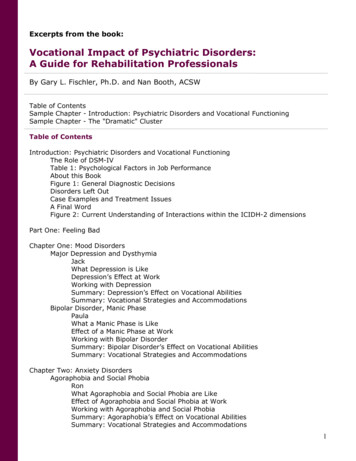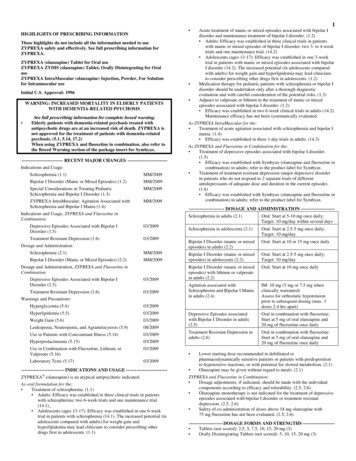
Transcription
CONTENTSThe Secret Life of Manic Depression:Everything you need to know about Bipolar DisorderPrefaceby Stephen Fry2Introductionby Richard Morriss, Professor of Psychiatry,University of Nottingham3Profile: Suzy Johnston4Imagine.5Not the only path.6Profile: Carrie Fisher78Who is this booklet aimed at?Manic depression and bipolar disorder: is there a difference?What is bipolar disorder?SymptomsDiagnosisProfile: Stephen Fry11Pathway of care diagram12How can you manage bipolar disorder?13Profile: Dr Liz Miller16Managing as someone in a supporting role17Profile: Heather Heald1920ConclusionAppendix One: Developing an action plan21Appendix Two: How is bipolar disorder treated?22Appendix Three: Where do you go for information and advice?23About the author / acknowledgements24
P R E FAC EI welcome this booklet on manic depression for the same reason that I agreed to presentthe BBC documentary, The Secret Life of the Manic Depressive. Like the programmes, thisbooklet goes beyond the formal language of diagnosis and treatment to explore what itmeans to live with and manage bipolar disorder.I’ve approached this project from the point of view of someone who has cyclothymia– charmingly called ‘bipolar lite’ by some in the USA.I’m fortunate because I’ve never suffered from stigma. I came out as someone with abipolar affective disorder for the same reason I came out as a gay man 25 years ago– I felt it was important for my own self-respect. But it was also something I could dorelatively easily because of my profession.“.more has been discovered aboutbipolar disorder in the past ten yearsthan was discovered in the previous 50”When I asked my Hollywood agent whether I was wise placing myself at the centre ofa documentary about bipolar disorder, he replied: “Sure! Contrary to popular opinionyou don’t have to be gay or Jewish to get on in Hollywood, but by God you’ve got to bebipolar. I can give you any number of people for your documentary.”I came away from making the BBC documentary feeling optimistic because more hasbeen discovered about bipolar disorder in the past ten years than was discovered inthe previous 50. Enormous strides have been made on all fronts, including the task ofremoving the stigma attached to the condition that I was spared.This booklet is playing its own role in that, and I hope it will help you to reach theconclusion, as I did, that a bipolar diagnosis is not a cause for despair.Stephen FryThe Secret Life of Manic Depression: Everything you need to know about Bipolar Disorder2
I N T RO D U C T I O NThis booklet describes the experiences of people with an illness called bipolar disorder,otherwise known as manic depression.It is a common health problem affecting between one and two per cent of the population,and it affects people of all ages. Unfortunately, there is on average an eight-year delaybefore the diagnosis is made by a doctor, long enough for a considerable amount ofdamage to a person’s life, including ending it by suicide.Bipolar disorder is a serious mental illness, but if it is well managed, with help from family,friends, support groups and health professionals, then a person with bipolar can leada productive and satisfying life. Many well-known people, from the composer RobertSchumann to the American actress and writer Carrie Fisher, have lived or live with thecondition. Bipolar disorder need not ruin your life: many people who manage bipolardisorder responsibly are married, have families, work, study and pursue pastimes of theirchoice.This booklet helps people to judge if they, or someone they are close to, should seek thehelp of a GP because they have some of the symptoms of bipolar disorder. By getting theright help early on, the social damage the condition can wreak can be limited, and peoplewill not die needlessly from suicide.It also outlines what people with bipolar disorder and their carers may be able to do tomanage their condition, with the help of health professionals and support groups.Information and sources of support are also available at bbc.co.uk/headroom.More detailed guidance on the sort of help the NHS offers can be found in the NationalInstitute for Health and Clinical Excellence (NICE) guidelines for managing bipolardisorder, available from the NICE website at www.nice.org.uk.Richard MorrissProfessor of PsychiatryUniversity of NottinghamThe Secret Life of Manic Depression: Everything you need to know about Bipolar Disorder3
P RO F I L E : S u z y J o h n s t o nI have bipolar.I am 33 years old. I am a graduate of the University of St Andrews.I have a filthy laugh. I am a hopeless cook. I spend hours justwatching the seagulls soar on the wind outside my bedroom window. Irepresented Scotland at under-16 level at squash. I have blue eyes. Iplay guitar in a rock band - loudly. I am a loyal friend. I am a cautiousdriver. I am clumsy. My glass is half full. I like the rain on my faceand the wind in my hair. I take medication every day. I am in theloveliest of relationships and I love him to bits. I like scrambled eggsfor breakfast. I have a rather eccentric cat. I am learning the drums.My neighbours are thinking of moving. I have an enquiring mind. I lovereading. I always break my own fall.but bipolar doesn’t have meSuzy JohnstonAuthorThe Naked Bird WatcherThe Secret Life of Manic Depression: Everything you need to know about Bipolar Disorder4
Imagine. . . that you wake up one morning supremely confident about your ability to solve all the problemsin your life, and to achieve all your ambitions and aspirations. Far from proving a temporaryemotion, this feeling turns into a driving obsession as each day goes by. Your mind is clearer, yourinstincts are sharper and you see solutions to every issue with a frightening clarity.You start acting on this feeling.Your performance in every area – work, study, home – rockets.Youbecome more charismatic and confident, and take the initiative in life in the way you always wantedto but never previously dared.You are completely in control of the events and relationships thatshape your life.You brush aside all opposition to your plans. The people who urge caution – partners,friends, family, colleagues – are just whingers who do not know how to play life’s game.Your spending increases as you follow your entrepreneurial instinct that to accumulate you needto speculate. The things you always wanted to buy, the experiences you always wanted to indulgein, are suddenly there for you to acquire. At a stroke, you are free from all the constraints andpetty daily nuisances that have held you back. The idea that there is something wrong – that youmight be ill – never occurs to you. The feelings of total disinhibition and exhilaration are simply tooenjoyable. You’ve never had so much fun.Gradually, you become aware that you are not in control. Like the driver of a car in the fast lane thatwill not respond to the brake, you become aware that you cannot slow your mind down. Thoughtsrace around your head, you cannot sleep, you start having hallucinations and paranoid thoughts.You start to question the motives of everyone who is concerned about your behaviour.You becomeirritable, angry and even violent if you feel anyone is standing in your way. Even now, the thought thatthere might be something wrong with you is too frightening to confront. So you prevaricate andrationalise, telling yourself that your fears and those of your loved ones are morbid and exaggerated.Then, one day, the world crashes around you.You find yourself in court, in a police station, in apsychiatric ward, out of a job, abandoned – the exact circumstances vary from one person to another.As the mood of exhilaration gives way to one of frightened despair, you realise that yourbehaviour has not only put your life at risk but damaged those of all the people you love. Notonly that. The illness they say you have – manic depression – has no known cure. You will needpsychiatric treatment for the rest of your life. The devastating emotions that you have justexperienced may resurface not just once but again and again. To cope, you will need to rein backor abandon not just your wildest dreams but also the ordinary ambitions ‘normal’ people canreasonably aspire to – a regular job, a stable marriage, the respect of people around you.In the depths of your depression, you cannot see beyond the frightening thought that there is norecovery, no redemption, no way through all this. Your mind starts to play around with thoughtsof suicide – not because you really want to die but because the pain of confronting this horribleprospect is just too great to bear.The Secret Life of Manic Depression: Everything you need to know about Bipolar Disorder5
Not the only path.Not all people diagnosed with bipolar affective disorder start their pathway to recovery this way,but a great many do. Left untreated, one in seven people with the diagnosis commits suicide. Yet agrowing number of people with a bipolar diagnosis find ways of rebuilding their lives. Advances indrug therapy, new approaches to non-medical treatment and, above all, a growing confidence inthe way people with a bipolar diagnosis are taking over management of their own lives – with theright care, help and advice – have made the path back from what is often a despairing crisis easierthan in the past.It’s also worth stressing that not everyone with a bipolar diagnosis suffers from such extreme swingsof mood. Here is an account by a teacher diagnosed with bipolar 2, a less severe form of the illness:“I had been depressed before on a number of occasions, withdrawn, miserable andlistless for a few days or weeks at a time. On one occasion things got so bad thatI took an overdose and ended up in the casualty department at my local hospital.I was working as a teacher and the head of year called me in and said that someparents were complaining because I was keeping the pupils after school without givingthem prior warning. My flatmates were concerned about the number of strangemen I was inviting back and about how I was staying up most of the night yet stillgetting up early for work.Then I got into trouble spending beyond the limit on my credit card. I startedgetting panicky about going to work. I became very tired, I didn’t go out or eatmuch, and I didn’t prepare for my lessons. This lasted weeks, but after a half-termbreak I thought I was back on form again, both at school and in my personal life.But the head of year called me in again and said there had been more complaints.Other staff thought my dress sense was a bit too colourful and another teacher saidI was flirtatious.“I told one of my flatmates. She said she had been increasingly worried about me andperhaps I should see my GP. He saw me on a few occasions, when I went throughanother down period and another period of high energy. He referred me to a localpsychiatrist who said I had a bipolar 2 disorder and wanted me to take medication.”Whatever the severity of their condition, people with a bipolar diagnosis are increasingly developingways of managing their own mood swings, working out ways of reducing their frequency and severity,and lessening the disruptive effect they can have on jobs, relationships and lives. The resulting boostto their self-esteem and sense of control plays an important part in their long-term wellbeing.The Secret Life of Manic Depression: Everything you need to know about Bipolar Disorder6
P RO F I L E : C a r r i e F i s h e rHollywood actor and writer Carrie Fisher – best known in the UKfor her role as Princess Leia in Star Wars in the 1980s – hasbeen in therapy since she was a teenager and has had to endurecountless well-documented periods of drink and drug addiction. Fromthis experience came her first bestseller Postcards From The Edge,which was made into a film starring Meryl Streep in 1990.In relation to her later diagnosis, the drugs and drink were ways of“keeping the monster in the box”. Being on the manic side of bipolardisorder, she says her drugs were a way to “dial down” the manicside. After telling a doctor about her experiences, her life to dateand how she felt “like a light bulb in a world of moths”, he diagnosedher as being bipolar and put her on lithium.This worked for a while but she soon missed her “up mood” and wouldplay with coming off her medication. That would frequently get herinto trouble. One time she came off medication when she went toAustralia to make a film and went completely manic. She insisted ongoing to China just because it was six inches away on the map.Now on medication regularly, Carrie takes about 20 pills a day andsays her writing helps her focus and channels her manic energy.Carrie’s triumph over mental illness has made her a very popularspeaker on the lecture circuit and she has appeared on the USSenate floor urging state legislators to increase government funding formedication for people living with mental health issues.The Secret Life of Manic Depression: Everything you need to know about Bipolar Disorder7
Who is this booklet aimed at?It is aimed not only at people who are confronting the realities of a bipolar diagnosis, but also atpeople who support them in learning how to manage their condition or who just want to help– whether they’re partners, family, friends or healthcare professionals.Most of the information provided here is aimed at the general reader, but there are individualsections aimed specifically at people with a bipolar diagnosis or people providing them with support.This booklet charts milestones along the path to recovery, highlighting the characteristics of bipolardisorder, its treatment and the main sources of information and support to which people can turn.Manic depression and bipolar disorder :is there a difference?No. In this booklet, the terms ‘manic depression’ and ‘bipolar disorder’ are used interchangeably.Bipolar disorder is the modern professional term for the mood swing condition that used to becalled manic depression.Most charities and healthcare organisations have now adopted bipolar disorder as a formal way ofdiagnosing the condition, but manic depression is still the most popular and commonly understoodterm to describe it.What is bipolar disorder?Bipolar disorder involves extreme swings of mood from mania (a form of euphoria) to deepdepression. It has no simple cause. There is strong evidence that it is associated with internalchemical changes to various natural transmitters of mood to the brain, but the precise way inwhich this happens is not yet known. The disorder can be triggered by the stresses and strains ofeveryday life, or a traumatic event or, in rare cases, physical trauma such as a head injury.The disorder can be triggered by thestresses and strains of everyday life.The most likely reason for severe mood swings, occurring as a result of these triggers, is that peoplewith a bipolar diagnosis are ‘predisposed’ to react in such a way, and that this ‘predisposition’ is genetic inquality. However, the results of research into the causes of manic depression are still far from conclusive.The average age of people being diagnosed with bipolar disorder used to be 32, but during thepast decade it has dropped to under 19. The reason is not known but it’s probably due to aThe Secret Life of Manic Depression: Everything you need to know about Bipolar Disorder8
number of factors, including increased awareness of the disorder among the public and mentalhealth practitioners, increased drug abuse and changing sources of life stresses.There is, understandably, much debate about the ethics of labelling children and young people witha bipolar diagnosis – not least because there is no definitive test for the illness, which can mean along delay before a conclusive diagnosis. However, one of the advantages of a correct diagnosis isthat it may allow for early and more effective treatment of young people if they have the disorder,which will in turn reduce its long-term impact.Symptoms: the highs, the lows and the in-betweensWe all experience highs and lows, but for people with a bipolar disorder these becomeincreasingly disconnected from everyday events and out of control. Each person’s way ofexpressing these moods is different, but people experiencing mania commonly become excessivelyself-important, expansive and over-confident. Depending on their inner beliefs and hidden desires,they may become sexually promiscuous, excessively religious, financially irresponsible, intolerant,verbally aggressive, irritable, overcommunicative and incapable of listening to or empathising withother people. Sleeplessness and overactive behaviour are common among people with mania.Untreated, the person can experience hallucinations, delusions and paranoia. Before the advent ofdrug treatment, people with bipolar disorder were recorded as dying of hunger and exhaustion.Each person’s way of expressing thesemoods is different.People experiencing depression commonly become apathetic, listless and excessively anxious.Their thinking can be dominated by sadness, guilt and a sense of life being pointless and lacking inall meaning. Panic and fear, as well as sleeplessness and a loss of appetite, are common symptoms.Untreated, the person can suffer from suicidal thoughts and, in some cases, the wish to self-harm.Hallucinations, delusions and paranoia also occur in extreme depression – a fact that often takesthe people supporting or caring for them by surprise, as these symptoms are more commonlyassociated with episodes of mania. The pattern of these moods varies from one individual to another.Some people are more affected by depression with just the occasional period of mania. For othersit is the other way around. Some people swing wildly from one mood to another – when a personexperiences four or more high and low periods during the course of one year this is sometimescalled ‘rapid cycling’. Others enjoy periods of prolonged stability between the moods.Mood swings seem to be triggered for some people by stressful events. For others, they appear tocome ‘out of the blue’. For some the highs and lows are relatively short; for others they may last severalmonths. Some people have just one or two mood swings during the course of their lives. Others havemood swings every year for many years – the swings sometimes becoming less severe with age.The Secret Life of Manic Depression: Everything you need to know about Bipolar Disorder9
Diagnosis: stumbles along the wayThe challenge facing everyone with manic depression is learning to understand and respond totheir own particular variation (see How can you manage bipolar disorder? page 13). In recent years,diagnoses of bipolar disorder have become more sophisticated to reflect these variations in moodpatterns. You are likely to come across diagnoses such as bipolar I, bipolar 2 or bipolar 3, whichreflect differences in both the severity and duration of moods. This enables each person – withsupport – to assess the right balance of drug and non-medical treatment that will best reduce thefrequency and severity of their moods. The strategy adopted will depend on the time it takes foreach individual with a bipolar diagnosis to accept and respond to it.diagnoses of bipolar disorder have becomemore sophisticated to reflect these variationsin mood patterns.The circumstances in which a diagnosis is made also vary from one person to another. Somepeople recognise their symptoms early enough to take the conventional pathway towardsdiagnosis and care via their GP and referral to a psychiatric unit. Others fight hard to deny theyare ill until a crisis – or a series of crises – forces them to accept they need help (see Pathway ofCare diagram page 12).The Secret Life of Manic Depression: Everything you need to know about Bipolar Disorder10
P RO F I L E : S t e p h e n F r y“I knew I was someone subject to emotional turbulence of the kindmost people were not from the age of 17, when I tried to commitsuicide and woke up in hospital with a tube down my throat.I didn’t, however, put a name to it until the age of 36, after mysomewhat infamous escape from the London play Cell Mates.That was when I first heard the word bipolar, although I veryrecently discovered – while filming the BBC documentary – thatmy old housemaster at school had kept a letter from the psychiatristI was sent to when I was 14 and he, too, had used the term bipolar,which is interesting because that was long before any of thosehyperactivity disorders had been diagnosed or become popular.He interpreted my condition as a mood disorder rather than apersonality disorder in an attempt, I suppose, to put my housemaster andmy parents at ease.I guess it sounds less serious but, frankly, if you’re committing suicideI wonder if the fact you’ve got a mood disorder rather than apersonality disorder is any kind of compensation?”This is an extract from an interview in Pendulum, the journal of MDF The Bipolar Organisation.The Secret Life of Manic Depression: Everything you need to know about Bipolar Disorder11
PAT H WAY O F C A R Econsultation66crisis6DENIALREFERRAL66766creating aninfrastructure of care7LACK OF INSIGHT6towards diagnosisand s a better lifeSUPPORTGPpsychiatric servicespartners, family, friendsTREATMENT‘talking’ therapiesself-help/support groupsSELF-MANAGEMENTmanaging your moodsplanning for episodeslooking after your familyand friends6control and self-esteem6relationshipsnew or renewedemploymentinterestssecurity Michel Syrett, 2006.12
How can you manage bipolar disorder?Managing as someone with a bipolar diagnosisThe Pathway of Care diagram (see page 12) illustrates broad stages in the journey to managingyour disorder successfully.The symptoms of the disorder are oftenonly spotted with the onset of a severecrisis in a person’s life – sometimes involvingcompulsory treatment under the MentalHealth Act 2007.People with milder forms of the disorder, such as bipolar 2 or 3, often have the insight to recogniseearly symptoms, engage in consultation with their GP and agree to a referral to a psychiatricoutpatient unit, which results in an accurate diagnosis.Lack of insightHowever, many people who develop a bipolar disorder have a distinct, and potentially destructive,lack of insight. The symptoms of the disorder are often only spotted with the onset of a severecrisis in a person’s life – sometimes involving compulsory treatment under the Mental Health Act2007. It is only then that they referred to a psychiatric unit and diagnosed.Precisely because there is no ‘test’ for manic depression, an accurate diagnosis sometimes takesyears (and several crises) to emerge.Towards diagnosisEven then you have to accept the diagnosis. Denial at this stage will lead into a cycle of crisis andre-diagnosis that, not confronted, can last decades.It’s easy to see why people shy away from accepting a bipolar diagnosis. The stigma attached tomental illness, despite all the advances in social understanding in the past two decades, is still great.Who wants to admit – to themselves or to other people – that they are mentally ill?Manic depression is also very frightening, particularly in its early stages. You don’t know what’shappening to you, you feel out of control and don’t know when, or if, it will happen again. You’renot always in control of your emotions or actions, and the people who suffer most are oftenthe people you care about the most. But conquering the fear, accepting the diagnosis and takingcontrol of your life is the key to success. Dr Liz Miller, who herself has a bipolar diagnosis andThe Secret Life of Manic Depression: Everything you need to know about Bipolar Disorder13
has developed a model for self-managing the condition (in collaboration with MDF The BipolarOrganisation), suggests there are three milestones in this stage of the pathway:AcceptanceThe first milestone is acceptance. Illness goes to the core of your own sense of being. It candestroy self-esteem and confidence. Yet without a level of acceptance it is impossible to moveforward. At this stage, information is helpful. Meeting other people who have had similarexperiences will inform your thinking. Many psychiatric outpatient services run small groups forpeople with bipolar and other affective disorders.MDF The Bipolar Organisation, as well as producing a series of leaflets and factsheets, has anextensive network of self-help groups (see Appendix Three).InsightFrom acceptance comes insight. Episodes rarely come out of the blue. Almost everyone has somewarning of impending illness. Warning signals are individual but in mania might include difficultysleeping, irritability, feeling oversexed, staying out late and spending too much. With depressionthere are also early warning signals, such as tiredness, not wanting to visit friends or losing interestin sex. Episodes are often triggered by specific problems, such as personal relationship stresses orcareer difficulties. Mental health professionals, close friends and immediate carers can be helpful inbuilding a more objective picture of what happens during an episode.With both mania and depression it is very important to be aware of these early changes andconsult your doctor or psychiatrist about possible changes to your medication (see Appendix Two).ActionFrom insight comes action. An action plan will provide you with a series of practical responsesshould an episode of the disorder look likely to develop. It should be designed so that youcan follow it when you can, but it should also indicate when carers, relatives, close friends andhealthcare professionals can intervene.A full description of what a typical action plan might entail is set out in Appendix One. It isimportant to rehearse the plan and update it frequently.Managing your bipolar disorder effectivelyThis means maintaining good mental health between episodes. Monitoring small changes inyour mood and spotting the early onset of symptoms will allow these to be acted on beforetrue depression and mania get started. Often mania and depression are maladaptive responsesto stress. They are ways of avoiding thinking about and facing up to problems. Facing problemsand sorting them out realistically helps your mental stability. Regularly reviewing your individualanxieties and stresses can stop them building up and provoking a major crisis. To help you do thisThe Secret Life of Manic Depression: Everything you need to know about Bipolar Disorder14
effectively, it is vital to nurture your social networks. If you do so, then close friends and relativeswon’t be frightened away and they will be able to provide you with valuable feedback.Facing problems and sorting them outrealistically helps your mental stability.Friends and relations can often see before you that something is going wrong. Moreover, goodsocial support improves mental health: part of staying well is about looking after relationships sothat they can survive the turbulence of illness.Towards a better lifeThe two final milestones of the pathway have less to do with treating the illness and more to dowith rebuilding your life once you have mastered its symptoms. The knowledge that you haveachieved control over the potentially damaging effects of the disorder will help to restore yourself-esteem.The resulting confidence will enable you to explore new avenues and possibilities in your life, orrestore those aspects of your previous life that really mattered. This can lead to new or renewedrelationships, employment opportunities and interests.The Secret Life of Manic Depression: Everything you need to know about Bipolar Disorder15
P RO F I L E : d r L i z M i l l e rDr Liz Miller is a highly qualified medical practitioner whose high-pressure career triggered – andwas in turn destroyed by – severe episodes of manic depression. Yet by accepting her diagnosis,seeking treatment and putting into practice the principles of self-management she advocates onprogrammes for other people with the disorder, she has rebuilt her life.“My career seemed to be going well, I was a qualified doctor and was trainingas a neurosurgeon. With plenty of research under my belt, and friends in highplaces, it seemed nothing could go wrong. But it did.A high-pressure career, combined with personal pressures, led to my first episodeof mania, sectioning and the end of neurosurgery. I left Scotland, telling no onewhat had happened, and a year or so later I was back at work, this time in anA&E unit. I had another high-flying career, another breakdown, more denial andmore lies on my CV. The medical profession didn’t help. In those days, there wassuch stigma about mental illness that had anyone known I would never have workedagain. Doctors didn’t get ill and I truly believed it.Only after my third breakdown, and after meeting other doctors in theBethlem Health Care Workers Unit, did the truth dawn on me. Perhaps therewas something wrong. I then accepted I had a mental illness that would be withme for the rest of my life.Three years of depression followed that insight, but I read all I could aboutmanic depression, mental health, neuroscience and psychology. I realised that,regardless of how many people told me that I had an illness and was not toblame, the truth is that I was, in part, responsible for what happened. I can do agreat deal myself to make sure it does not happen again.Over the past ten years, I have researched manic depression, self-managementand healthy living. I know from my neurosurgical experience that the brain, likethe body, heals if we give it a chance. I know that because of the way I livemy life – full of vitamins and self-awareness – no one else is going to ruin myday, it’s up to me. I now work in general practice and occupational health andhave never been happier.”The Secret Life of Manic Depression: Everything you need to know about Bipolar Disorder16
The Secret Life of Manic Depression: Everything you need to know about Bipolar Disorder 4. Imagine. . . that you wake up one morning supremely confident about your ability to solve all the problems in your life, and to achieve all your ambitions and aspirations. Far from proving a temporary










